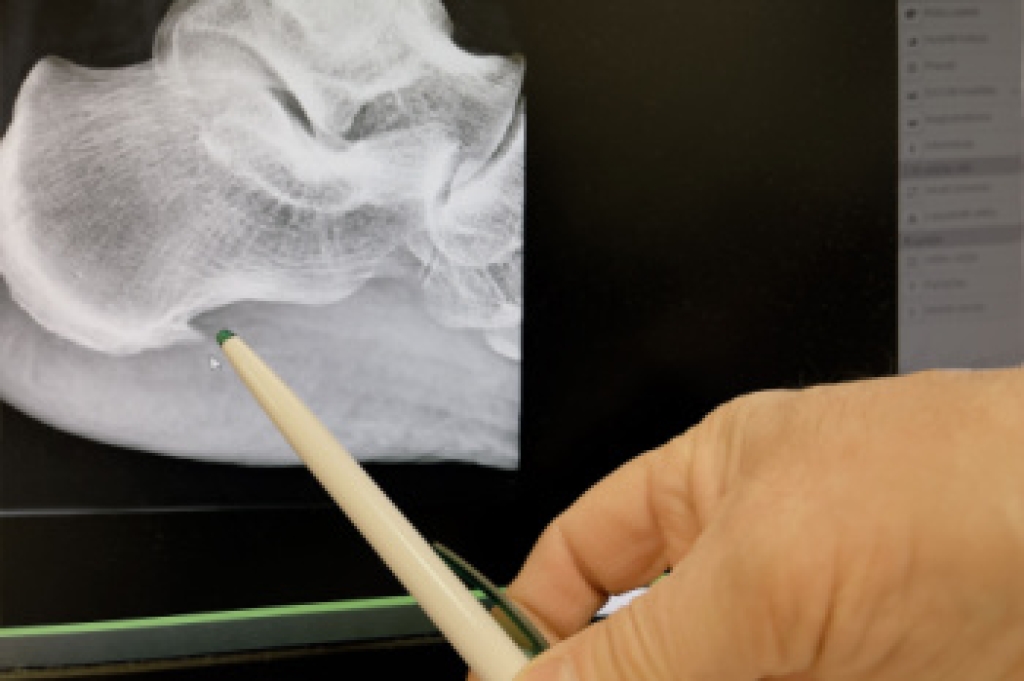Blog
Types of Ankle Fractures

The ankle joint is formed by the tibia and fibula from the lower leg, and the talus in the foot. These bones are supported by ligaments that create a ring-like structure to maintain ankle stability. Ankle fractures can occur in different parts of this joint, depending on how the force is applied. Common types include fractures of the outer fibula, the inner tibia, and back of the tibia. In some cases, more than one area is fractured, or a ligament may tear at the same time. An avulsion fracture in the ankle occurs when a ligament pulls off a small piece of bone where it attaches, sometimes mimicking a severe sprain. A fractured ankle typically causes pain, swelling, and difficulty bearing weight. X-rays are needed to confirm the break and assess whether the ankle remains stable. If you believe you have fractured an ankle, it is suggested that you make an immediate appointment with a podiatrist for an exam, diagnosis, and appropriate treatment.
Broken ankles need immediate treatment. If you are seeking treatment, contact one of our podiatrists from Nashville Family Foot Care. Our practitioners can provide the care you need to keep you pain-free and on your feet.
Broken Ankles
A broken ankle is experienced when a person fractures their tibia or fibula in the lower leg and ankle area. Both of these bones are attached at the bottom of the leg and combine to form what we know to be our ankle.
When a physician is referring to a break of the ankle, he or she is usually referring to a break in the area where the tibia and fibula are joined to create our ankle joint. Ankles are more prone to fractures because the ankle is an area that suffers a lot of pressure and stress. There are some obvious signs when a person experiences a fractured ankle, and the following symptoms may be present.
Symptoms of a Fractured Ankle
- Excessive pain when the area is touched or when any pressure is placed on the ankle
- Swelling around the area
- Bruising of the area
- Area appears to be deformed
If you suspect an ankle fracture, it is recommended to seek treatment as soon as possible. The sooner you have your podiatrist diagnose the fracture, the quicker you’ll be on the way towards recovery.
If you have any questions, please feel free to contact our office located in Nashville, TN . We offer the newest diagnostic and treatment technologies for all your foot care needs.
How to Recognize Plantar Fasciitis

Plantar fasciitis typically causes heel pain, often felt after long periods of rest or first thing in the morning. This pain is caused by inflammation of the plantar fascia, a thick band of tissue running along the bottom of the foot. The plantar fascia supports the arch and absorbs shock when walking or running. Repeated strain can lead to tiny tears in the tissue, especially where it attaches to the heel bone. Over time, these tears result in inflammation and discomfort. Runners and athletes often experience worsening pain during exercise, and the condition can interfere with daily activities, if left untreated. Risk factors for plantar fasciitis include high-impact activities, wearing improper footwear, and abnormal foot mechanics. A podiatrist can diagnose the condition and recommend treatment options to alleviate the pain. If you experience heel pain during or after exercise or sports activities, it is suggested that you schedule an appointment with a podiatrist for expert advice and guidance.
Plantar fasciitis is a common foot condition that is often caused by a strain injury. If you are experiencing heel pain or symptoms of plantar fasciitis, contact one of our podiatrists from Nashville Family Foot Care. Our practitioners can provide the care you need to keep you pain-free and on your feet.
What Is Plantar Fasciitis?
Plantar fasciitis is one of the most common causes of heel pain. The plantar fascia is a ligament that connects your heel to the front of your foot. When this ligament becomes inflamed, plantar fasciitis is the result. If you have plantar fasciitis you will have a stabbing pain that usually occurs with your first steps in the morning. As the day progresses and you walk around more, this pain will start to disappear, but it will return after long periods of standing or sitting.
What Causes Plantar Fasciitis?
- Excessive running
- Having high arches in your feet
- Other foot issues such as flat feet
- Pregnancy (due to the sudden weight gain)
- Being on your feet very often
There are some risk factors that may make you more likely to develop plantar fasciitis compared to others. The condition most commonly affects adults between the ages of 40 and 60. It also tends to affect people who are obese because the extra pounds result in extra stress being placed on the plantar fascia.
Prevention
- Take good care of your feet – Wear shoes that have good arch support and heel cushioning.
- Maintain a healthy weight
- If you are a runner, alternate running with other sports that won’t cause heel pain
There are a variety of treatment options available for plantar fasciitis along with the pain that accompanies it. Additionally, physical therapy is a very important component in the treatment process. It is important that you meet with your podiatrist to determine which treatment option is best for you.
If you have any questions, please feel free to contact our office located in Nashville, TN . We offer the newest diagnostic and treatment technologies for all your foot care needs.
Key Facts About Heel Spurs

A heel spur is a bony growth that develops on the underside of the heel bone, often caused by long-term stress or inflammation in the foot. Common causes include natural wear and tear, intense physical strain from running, standing for long periods of time, and footwear that lacks adequate support. Symptoms include sharp heel pain, tenderness, and discomfort that worsens with activity. A podiatrist can diagnose a heel spur using physical examination and imaging, then recommend treatments such as custom orthotics, supportive shoes, stretching exercises, and in some cases minimally invasive procedures. If heel pain is interfering with your daily life, it is suggested that you schedule an appointment with a podiatrist who can accurately diagnose and treat heel spurs.
Heel spurs can be incredibly painful and sometimes may make you unable to participate in physical activities. To get medical care for your heel spurs, contact one of our podiatrists from Nashville Family Foot Care. Our practitioners will do everything possible to treat your condition.
Heels Spurs
Heel spurs are formed by calcium deposits on the back of the foot where the heel is. This can also be caused by small fragments of bone breaking off one section of the foot, attaching onto the back of the foot. Heel spurs can also be bone growth on the back of the foot and may grow in the direction of the arch of the foot.
Older individuals usually suffer from heel spurs and pain sometimes intensifies with age. One of the main condition's spurs are related to is plantar fasciitis.
Pain
The pain associated with spurs is often because of weight placed on the feet. When someone is walking, their entire weight is concentrated on the feet. Bone spurs then have the tendency to affect other bones and tissues around the foot. As the pain continues, the feet will become tender and sensitive over time.
Treatments
There are many ways to treat heel spurs. If one is suffering from heel spurs in conjunction with pain, there are several methods for healing. Medication, surgery, and herbal care are some options.
If you have any questions, please feel free to contact our office located in Nashville, TN . We offer the newest diagnostic and treatment technologies for all your foot care needs.
Causes of Swollen Feet and When to Seek Help

Swelling in the feet and ankles can result from various conditions, including pitting edema, where pressure leaves a visible indentation, or lymphedema, caused by poor lymphatic drainage. Pregnancy can also lead to fluid retention due to hormonal changes and increased pressure on veins. These symptoms may signal underlying issues, including vein insufficiency, heart problems, or infections. A podiatrist can evaluate the cause of swelling, provide supportive care, and recommend compression therapy, or footwear changes. If you notice persistent or painful swelling in your lower limbs, it is suggested that you seek help from a podiatrist to identify the cause and begin a treatment plan to improve your comfort, mobility, and overall foot health.
Swollen feet can be a sign of an underlying condition. If you have any concerns, contact one of our podiatrists of Nashville Family Foot Care. Our practitioners can provide the care you need to keep you pain-free and on your feet.
Swollen feet are a common ailment among pregnant women and people who stand or sit for extended periods. Aging may increase the possibility of swollen feet and patients who are obese often notice when their feet are swelling too. There may be medical reasons why swollen feet occur:
- Phlebitis - A condition that causes the veins to become inflamed and can also cause leg pain.
- Liver disease - This may lead to low blood levels of albumin which is a protein. This can cause fluid in the blood to pass into the tissues and several areas of the body can become swollen.
- Heart failure - When the heart doesn’t pump properly the blood that is normally pumped back to the heart can pool in the veins of the legs causing swollen feet.
- Kidney disease - One of the main functions of the kidneys is releasing excess fluid in the body. This type of condition can make it difficult for the kidneys to function properly, and as a result the feet may become swollen.
- Deep-vein thrombosis (DVT)- This is a serious condition where blood clots form in the veins of the legs. They can block the return of blood from the legs to the heart which may cause the feet to swell. It is important to be treated by a podiatrist if this condition is present.
Swollen feet can also be caused by bone and tendon conditions, including fractures, arthritis, and tendinitis. Additionally, there may be skin and toenail conditions and an infection may cause the feet to swell. Patients who take medicine to treat high blood pressure may be prone to getting swollen feet.
Many patients elevate their feet to help relieve the swelling and this is generally a temporary remedy. When a podiatrist is consulted the reason behind the swelling can be uncovered and subsequently treated.
If you have any questions please contact our office located in Nashville, TN . We offer the newest diagnostic and treatment technologies for all your foot and ankle needs.

